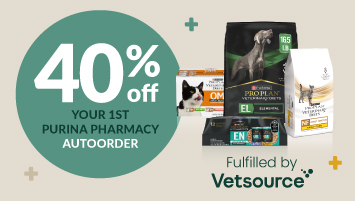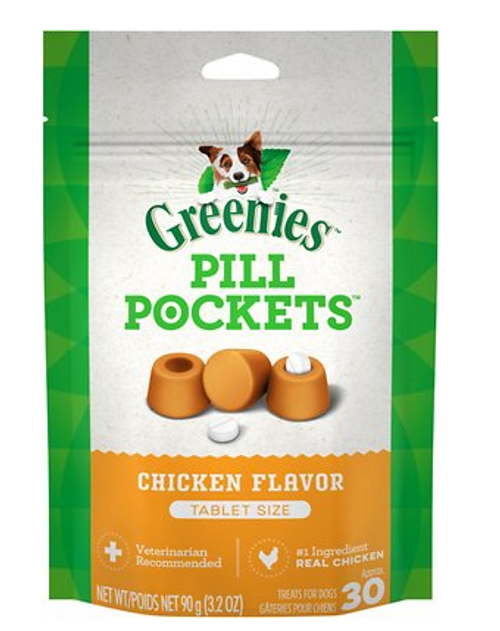Product details
Meloxicam is a nonsteroidal anti-inflammatory drug (NSAID) used to treat acute or chronic pain and inflammation in animals.
This product is a tablet formulation.
-
Used to treat pain, inflammation, and osteoarthritis in dogs.
-
Dosing these tablets may be difficult in smaller animals (e.g., cats) due to limited availability of generic strengths. Please discuss your pet’s treatment options with your veterinarian.
-
Do not administer to animals with active GI ulcers or bleeding, or those taking other anti-inflammatory medications (e.g., other NSAIDs, corticosteroids).
-
May be prescribed for other animal species; please consult your veterinarian.
-
While this drug does not have an FDA-approved indication for all animal uses, it is commonly accepted for veterinarians to prescribe this medication for use in animals.
*Please note: This is a generic medication. Product packaging and appearance, including size, color, and shape, may differ from the description or images provided and are subject to manufacturer availability.
Product sourced directly from the manufacturer or their approved distributor. Guaranteed genuine product backed by the manufacturer.
For
Dogs
Active ingredient(s)
Meloxicam
Common brand names
Mobic
Drug class
Nonsteroidal anti-inflammatory drug
Product strength & size
Meloxicam tablets may be available in multiple strengths and/or sizes. Please ensure the selected product and package size are appropriate for your pet, as recommended by your veterinarian.
For current availability, please refer to the product selection above.
Usage
Meloxicam Tablets should be given orally as directed by your veterinarian. Please consult your veterinarian before making any changes or discontinuing the prescribed dosing schedule.
This medication is best given with food to help prevent gastrointestinal side effects.
Ensure your pet always has access to fresh, clean drinking water while taking this medication.
Missed doses
Administer the dose as soon as possible. If it is almost time for the next dose, skip the missed dose and continue with the regular schedule. Do not give two doses at once.
Storage
Store in a cool, dry place at a controlled room temperature (68 to 77°F, brief excursions permitted between 59 and 86°F). Keep in a tight, light-resistant container and out of the reach of children and pets. Store away from heat and direct sunlight. Do not store in the bathroom, near the kitchen sink, or in damp places. The medicine may break down if exposed to heat or moisture.
Side effects
This medication is generally well tolerated in animals. The most common side effects of this medication are vomiting, diarrhea, and decreased appetite.
In rare cases, serious adverse effects including GI ulceration and kidney or liver issues can develop.
Contact your veterinarian immediately if your pet has complete loss of appetite; extreme fatigue, weakness, or lack of coordination; seizures; behavioral changes (e.g., aggression); changes in activity level, urinary habits, or fluid intake; vomit that appears bloody or has a “coffee grounds” appearance; black, tarry, or bloody stools; or if you notice yellowing of the skin, whites of the eyes, and/or gums.
Notify your veterinarian if your pet experiences any of the effects described above, or if you notice any other side effects that are persistent or troublesome.
If you notice anything unusual, please consult your veterinarian.
Precautions
Do NOT administer to animals that are not eating normally, that have active GI ulcers or bleeding, or those taking other anti-inflammatory medications (e.g., other NSAIDs, corticosteroids).
Use with caution in cats, geriatric animals, and dogs younger than 6 months old. Caution should also be exercised in animals with a history of GI ulcers; current issues with vomiting, diarrhea, and/or hydration; impaired heart, kidney, or liver function; and in animals that have a predisposition to excessive bleeding (or that are taking an anticoagulant).
Safe use of this medication has not been established and should be used with caution in breeding, pregnant, or lactating animals. Discuss the risks of using this medication with your veterinarian if your pet is in one of these groups.
Do not administer to animals with a known history or suspected allergy/hypersensitivity to any NSAID drug, including this medication or any of its ingredients. Allergic reactions to medications may occur. Be sure to inform Vetsource and your veterinarian if your pet has any known drug sensitivities or allergies.
If your pet displays symptoms of an allergic reaction, discontinue therapy and call your veterinarian immediately or seek emergency veterinary attention. Symptoms may include (but are not limited to): swollen lips, tongue, face, or airways; difficulty breathing; agitation; profuse salivation; and widespread hives or itching.
Drug and food interactions
The following drugs* may have potential interactions with this medication: anticoagulants (e.g., heparins, rivaroxaban, warfarin), antidiabetic agents (including insulins), beta blockers (e.g., atenolol, sotalol), bisphosphonates (e.g., alendronate), blood pressure medications (e.g., enalapril, sildenafil, telmisartan), calcium channel blockers (e.g., amlodipine, diltiazem), clopidogrel, corticosteroids (e.g., dexamethasone, prednisone), cyclosporine, digoxin, diuretics (e.g., furosemide, hydrochlorothiazide, spironolactone), fluoroquinolone antibiotics (e.g., ciprofloxacin), methotrexate, concurrent NSAIDs, pentoxifylline, salicylates (e.g., aspirin, bismuth subsalicylate), SSRIs (e.g., fluoxetine, sertraline), toceranib (Palladia), and tricyclic antidepressants (e.g., amitriptyline, clomipramine).
*NOTE: this may not be a comprehensive list. Contact your veterinarian if your pet experiences any unusual reactions when different medications are given together.
Please ensure your veterinarian is aware of all medications and supplements that your pet is currently receiving. Your veterinarian may prescribe multiple medications, even if a potential drug interaction may occur. In these instances, your veterinarian may adjust the dosages or monitor your pet more closely.
Adverse reactions
If you are concerned that your pet has experienced an adverse reaction to this medication, please contact Vetsource Pet Owner Care at 877-738-4443.
Overdose
If you have any reason to suspect an overdose, call your doctor/veterinarian or the appropriate poison control resource immediately.
For humans:
The national toll-free Poison Help line, 1-800-222-1222, will connect you to your local poison center in case of emergency. This service is available nationwide and in most U.S. territories.
For animals:
The ASPCA Animal Poison Control Center is available 24 hours a day, 365 days a year at 888-426-4435.
Pet Poison Helpline® also provides a 24/7 animal poison control service at 855-764-7661.
*Please note: this information is for third-party services and is provided for convenience in case of potential poison-related emergencies. There may be consultation fee for these services.
Disclaimer
The content provided on this page is NOT medical advice.
All content, including the images and product description above, is intended for general informational purposes only and should not be considered a substitute for professional veterinary consultation, diagnosis, or treatment.
Consult your veterinarian for complete information about this product and how it fits into your pet's individual treatment plan.
Last revised: 7/02/2025





















